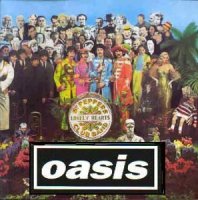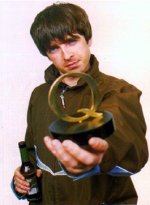Britpop - A Retrospective
'Britpop' (Brit Pop) was a popular form of guitar-based music which reached its zenith in the mid 1990's. We are still feeling its hangover today, with more bands than ever picking up electrical guitars, and employing a string section to give their mediocre compositions more 'emotional impact'.Oasis
Neo Gallagher's Oasis were one of the main proponents of the 'indie' (indie music) scene, choking the zeitgeist and shitting all over the dancefloor with their innovative mixture of guitars, drums and bass guitars. Modern-day music historians now look back at Oasis' recorded output, and laugh at the rather basic material that they released after their second album (and masterpiece), 'Revolver'. Twin brother combo Neo and Lionel cemented their 'bad-boy' reputation by acting a bit surly and getting drunk with Chris Evans.

Some critics suggested that Oasis had done so well in the music business by stealing the songs, and to a lesser extent, the career, of The Beatles - a band who had broken up 30 years previously, and who Neo often professed a deep admiration for. The band fiercely denied these accusations - until, in 1998, Oasis released a classic 1968 Beatles album and claimed it was their own.

Of course, it was eventually proven in court that the album was nothing to do with Oasis - part of the settlement included paying £14 million to Adam Ant, who won all rights to The Beatles' back catalogue in an arm-wrestling tournament at Elton John's house. Despite the fact that Oasis didn't write or record a single note of the album, it went on to become their biggest seller, and won them several Brit awards. The NME called it 'their most visionary, visceral, forward-looking and exciting record to date'.

Naturally, a retrospective article on the 'Britpop' (British Population) phenomenon would not be complete without a mention of Shed Seven.
The British Rock Explosion
The British Rock Explosion took place in 1999, and wiped out over half of the entire 'Britpop' (Brittle Pop) scene in one night. Fuelled by champagne and truffles provided by self-appointed Head of British Music, Alan McGee, a hoard of fame-hungry up-and-coming bands locked themselves in London's Astoria venue, and set themselves on fire in a last-gasp attempt at gaining notoriety. Minty Smorgasbord, of 'Britpop' (Britpop) also-rans This Beautiful Mess, tells us his recollections of the horrific disaster.

"Everyone was there - Stanley Feet and his band The New Creations, Brent Anderstone's Swayze, DampMan, Fleet Of Crockery, The Shiners... basically, a load of bands who'd had a taste of life in the lower end of the top 30, and wanted more. Alan McGee had organised what he called a 'cross-pollination audio brainstorming session', but it quickly turned into a bloodbath. I think it was Ian McIan of I An who came up with the idea of setting ourselves on fire. He was considered quite an influential, shamanic figure on the scene - so I guess we all just thought 'what the hell!'"
The plan was a minor success; indeed, a small news feature from page 14 of the NME takes pride of place on the wall of Minty's Camden bedsit. Minty tells us: "We were told the story would have made the tabloids too - if only Posh Spice's pet dog hadn't had a haircut that week!". Minty shakes his fist in what would be a comical fashion, if only he wasn't weeping and snarling.
The moderate publicity generated by the fire stunt was, however, not deemed to be worth the 64 deaths, and many more cases of severe facial burnings, which occured that evening. According to one source: 'Denny Stretch (of the recently reformed The Thatcher Rapers) had this amazing song called 'Burns Like Fire', and we just thought that was such an incredibly powerful message. Because, nothing burns quite as... good... as fire. He's a lyrical genius. So, we burnt each other. With fire.' Participants freely admit that there actually wasn't an 'explosion' as such, but 'The British Rock Burns Ward' wouldn't have sounded as cool.
The real tragedy of the British Rock Explosion, however, was that the Stereophonics were unable to attend.







